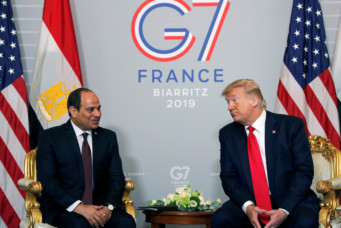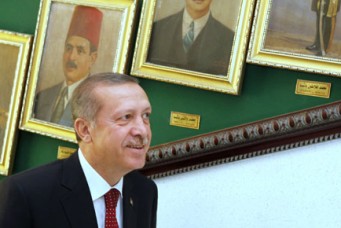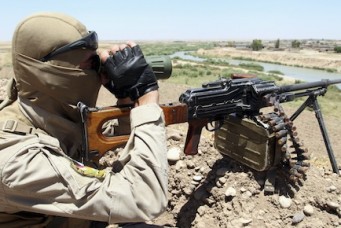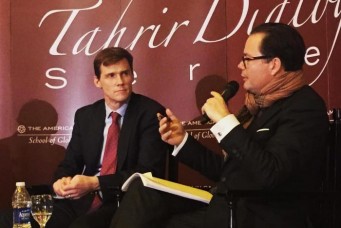The U.S.–Middle East Future: In the Face of Fatigue
As the Trump presidency ends and Joe Biden is set to be the next U.S. president, thinkers convene to consider what his administration means for the Middle East.
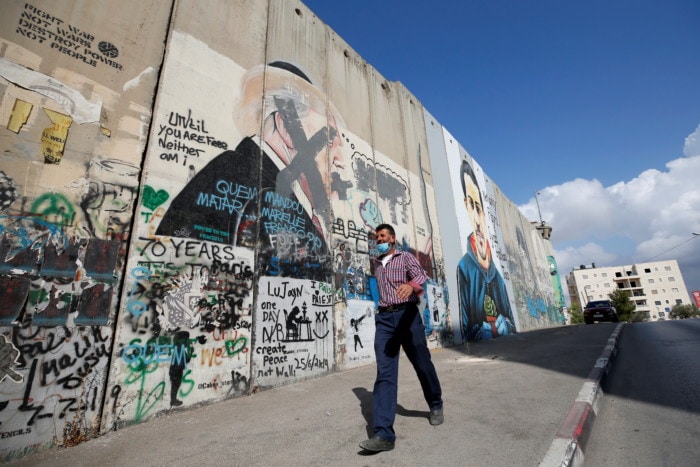
Donald Trump’s election to the U.S. presidency in 2016 was a surprise to many. “I’m sure, for most Americans, it’s been an emotional rollercoaster,” said Mina Al-Oraibi, Iraqi journalist based in Abu Dhabi and Editor-in-Chief of the National. Al-Oraibi was the main speaker at a webinar titled “A Conversation with Mina Al-Oraibi” hosted by Harvard University’s Middle East Initiative on November 5. In her presentation, Al-Oraibi outlined the United States–Middle East relationship over the past two administrations and charted the way in which it may evolve.
Event Co-moderator Karim Haggag, former Egyptian ambassador and professor at the American University in Cairo, asked whether challenges like COVID-19, political unrest, and election uncertainty have changed the Middle East’s perception of the United States. Al-Oraibi explained that the United States’ role as a global superpower started to weaken with the invasion of Iraq in 2003. The deterioration continued as the Obama administration intervened ineffectually in Syria. At these points, the United States did not act like a superpower.
The United States once lauded itself as a beacon of democracy; yet, its response to COVID-19 has exposed foundational cracks. With over two hundred and fifty thousand dead, the rest of the world wonders whether the United States can take care of itself: and, if not, how can it help any other nation?
To Al-Oraibi, the most surprising part of the Trump presidency has been the way that the United States’ standards of accountability have shifted. Trump’s shock factor is so unyielding that statements or actions which would have forced public officials to resign five years ago have become mere blips in the news cycle. Al-Oraibi pointed to the support President Trump still has, as evidenced by his winning over seventy-three million votes for reelection. Biden won the election with over seventy-eight million popular votes and 306 electoral seats (a quorum of 270 is necessary to win). Nonetheless, the fact remains that Trump—running for reelection during a pandemic and global economic recession—was still able to galvanize eleven million more voters to his side than in 2016. To explain Trump’s continued popularity, Al-Oraibi cited widespread resentment for the “establishment”. In 2016, Trump capitalized on this by purposefully billing himself as a political outsider. Yet, it is ironic, stated Al-Oraibi, that Trump is an outsider only in job experience: his wealth and privilege are norms to which most of Washington subscribe.
Co-moderator Tarek Masoud, Professor of Public Policy and the Sultan Qaboos bin Said of Oman Professor of International Relations at Harvard University’s John F. Kennedy School of Government, turned the conversation more broadly toward democracy as a concept. While Trump alleges nonexistent voter fraud and vows not to leave office despite his loss, the effectiveness of the U.S. electoral system has been brought into question, as has the resilience of U.S. institutions. Al-Oraibi noted that for years the United States has criticized political processes in the Middle East. Now, pundits in the region quip that the Middle East has to teach the United States how to hold elections.
Al-Oraibi emphasized that it is difficult to generalize about the Middle East, a vast region home to different cultures, languages, religions, and circumstances. In assessing the way that the region relates to U.S. society, she pointed to a division between youth and older elites.
Al-Oraibi first pointed to a large contingent of Arab youth who may have studied in the United States; whose parents may have done so; or who feel an affinity for U.S. culture. Yet, some young Arabs now feel that the pillars that long attracted travel to the United States—education, technology, the arts—no longer represent the same opportunity that they used to. In the place of American universities, those in Canada and, recently, New Zealand have become popular destinations for many to study.
Masoud pointed to the support given to Trump’s “Muslim ban” by the Gulf countries and Syria as evidence for a need to assess political leadership separately, and asked whether the gap in attitude between leaders and citizenry in the Middle East may cause dissatisfaction on behalf of the latter. Al-Oraibi responded that the way leaders and the people interact is quite dependent on national context. “The average Iraqi is so much different from the average Emirati,” she said.
Al-Oraibi went on to explain that the relationships between the elites and the youth majorities in many Middle Eastern countries are often devoid of trust: in these cases, disgruntlement is inherent. There, citizens might see their countries’ leadership as puppets of the United States. However, there is a small minority of regional states where individuals hold complete faith in their governments. In such nations, Al-Oraibi stated, if leaders support American actions, that feeling will resonate with the populace.
Inherited Challenges
The United States’ perceived cultural retreat in the Middle East, stated Al-Oraibi, has been accompanied by political and military withdrawal from the region, as evidenced by the destruction of the Iran deal and withdrawal from Syria. Many Middle Eastern countries wish that U.S. military and political presence could be divorced; yet, in recent history, such a division has proved challenging. U.S. military withdrawal can be traced back to fatigue, which likewise promotes political disengagement.
As the United States withdraws from the Middle East, the region watches America “pivot to Asia”, a strategic reorientation begun by the Obama administration. In the United States, discussions of China’s rise often carry a negative connotation. In the Middle East, Al-Oraibi explained, emotions are more mixed regarding China. Even today, Chinese presence in the region is not nearly as large as the United States’; however, there is a concern that further U.S. disengagement will create a vacuum. Clearly, the hope is that regional powers could fill the emerging vacuum instead of China, but a more pronounced Chinese entry into the Middle East is possible. Thus, Al-Oraibi outlined a need for outside powers to have political engagement in the Middle East but with no strings attached.
Trump’s Middle East policy over the last four years has centered on the Gulf countries. Al-Oraibi related that Trump vetoed legislation that would end U.S. assistance to Saudi Arabia in Yemen, withdrew from the Iranian nuclear deal, and passed the Abraham Accords between Israel, Bahrain, and the United Arab Emirates. Biden, on the other hand, is expected to restart nuclear negotiations with Iran.
Ultimately, Al-Oraibi said she foresees a stalemate in the region during the Biden presidency. Though she did not think Biden would trigger a weakening of ties to a traditional ally like Saudi Arabia, she did not see a resolution of major conflicts—like those in Yemen, Libya, and Israel and Palestine—as likely either.
Al-Oraibi stated that, had she been able to vote in the U.S. election, she would have been a “single-issue voter” focusing on what Biden’s and Trump’s positions on Iraq are. She called a plan proposed by President-Elect Joe Biden in 2006—which suggested partitioning Iraq along Shia, Sunni, and Kurdish lines—distressing, and worried that a Biden administration will take an overly sectarian view of the Middle East. Trump, she said, is more transactional, though Masoud contended that he is similarly superficial. Al-Oraibi also invoked Biden’s role as Vice President to former President Obama, who she said swept regional concerns about Iran under the rug. Al-Oraibi pointed to a feeling of duplicity from the Obama–Biden White House. At the minimum, “with Donald Trump, what you see is what you get,” she said.
Masoud recalled an October op-ed for the National in which Al-Oraibi called Iraq “the country in which U.S. elections matter as much as they do in America.” Al-Oraibi posited that the next U.S. administration’s policy on Iraq should aim to support the state and its institutions. When asked by Masoud how she would convince Americans to “bear the cost” of supporting Iraqi institutions—a phrase often used by U.S. policymakers—Al-Oraibi noted that a large cut of U.S. funds channeled toward Iraq actually go to U.S. contractors there. “There are a lot of very rich Americans out of the war in Iraq,” she stressed.
In order to provide the best institutional support, Al-Oraibi prescribed narrow channels of communication. In Iraq, she said that a lack of adherence to delineated roles allows foreign parties to “undercut the actual institutions by dealing with the people that they’re comfortable with, and [playing] them off each other.”
“Everybody acts as Foreign Minister in Iraq—the head of Parliament acts as Foreign Minister in Iraq,” she added. Institutions can be strengthened by ensuring that foreign money is channeled through state structures. This is in contrast to the strategy taken in the fight against the Islamic State, Al-Oraibi said, where the United States armed individuals indiscriminately.
Emergence of a Regional Voice
In order to confront challenging regional issues, the question of who is best fit to approach them must be raised. Haggag stated that oftentimes U.S. criticism of the Middle East critiques a lack of regional leadership. Al-Oraibi agreed that “an Arab voice is missing.” In the case of Palestine, for example, Middle Eastern leaders are quick to blame the Abraham Accords as a barrier to a peaceful settlement; yet, the region hasn’t approached the dispute with a united front in years. “So many leaders will wax lyrical about Palestine… when they have done zilch, zero, for Palestine,” Al-Oraibi said.
In order for that voice to emerge, an honest conversation among regional players about mutual interests is needed. Can the United States access oil and levy counterterrorism operations without destabilizing regional states? Can the United States help Middle Eastern nations bring technological research and development to local markets in return? It is clear that a conversation aligning interests in full transparency needs to occur, said Al-Oraibi. However, such discourse may have to be put on hold for the moment. Not only is the United States fatigued, as exhibited by its military withdrawal from the region, but COVID-19 forces all governments to look inward. In the short term, pandemic responses will likely take precedence over creating transregional inroads.
Sydney Wise is contributing editor at the Cairo Review of Global Affairs. Her past work has been published at the Boston Consortium for Arab Region Studies. On Twitter: @sydneyywisee
Read More
